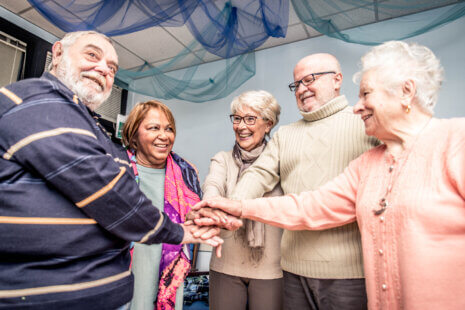Intergenerational relationships, which involve interactions between individuals from different age groups, play a crucial role in promoting well-being across various generations. These relationships encompass interactions between grandparents and grandchildren, mentors, and mentees, as well as community connections between people of different age groups. The positive impact of these connections on the emotional, social, and cognitive well-being of individuals cannot be overstated.
One of the key benefits of intergenerational relationships is the transfer of wisdom and knowledge from older generations to the younger ones. Grandparents, for example, often serve as valuable sources of guidance and wisdom for their grandchildren, sharing life experiences, values, and traditions. This exchange fosters a sense of belonging, identity, and continuity for the younger generation, providing them with a strong foundation for navigating life’s challenges.
Moreover, intergenerational relationships contribute to the emotional well-being of individuals by providing a support system that transcends generational boundaries. Older adults, through their life experiences and resilience, offer understanding, empathy, and emotional support to younger individuals facing personal struggles. In turn, younger individuals bring vitality, new perspectives, and a sense of purpose to the lives of older adults, alleviating feelings of loneliness and isolation that can sometimes accompany aging.
These relationships also stimulate cognitive well-being by creating opportunities for learning, creativity, and personal growth. For instance, older adults can share their skills, hobbies, and knowledge with younger individuals, fostering a sense of curiosity and intellectual engagement. Conversely, younger individuals often introduce older adults to new technologies, trends, and ideas, thereby promoting mental agility and adaptability. Such dynamic interactions contribute to the overall cognitive vitality of both age groups.
Beyond the individual level, intergenerational relationships have significant societal implications. By bridging the gap between different age groups, these relationships promote mutual understanding and respect, thereby reducing ageism and negative stereotypes. Intergenerational connections also facilitate the passing down of cultural heritage, traditions, and values, preserving collective wisdom and strengthening social bonds within communities.
In today’s fast-paced and technologically driven world, efforts to nurture and promote intergenerational relationships are more important than ever. As families become more geographically dispersed and social structures evolve, intentional initiatives aimed at fostering connections between generations are vital. Organizations, schools, and communities can play a pivotal role in creating platforms for intergenerational interaction, such as intergenerational learning programs, community service projects, and joint activities that promote dialogue and understanding across age groups.
Furthermore, policies and initiatives that promote age-integrated communities and intergenerational housing can provide tangible support for fostering meaningful relationships between older and younger individuals. These integrated living arrangements not only address housing needs but also create environments where mutual support, companionship, and collaboration can flourish.
In conclusion, the role of intergenerational relationships in promoting well-being cannot be overstated. From the transfer of wisdom and knowledge to the emotional and cognitive benefits, these connections enrich the lives of individuals across generations. By recognizing the value of these relationships and actively cultivating opportunities for interaction, we can build stronger, more cohesive communities and support the well-being of individuals of all ages. The magic of intergenerational relationships lies in their ability to foster connection, understanding, and resilience, creating a tapestry of shared experiences that uplifts and sustains each generation.





